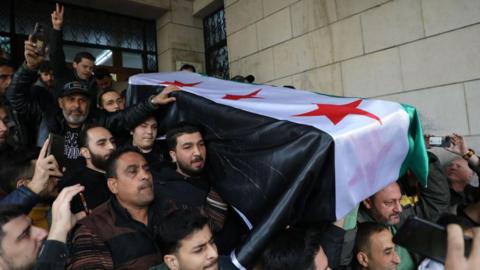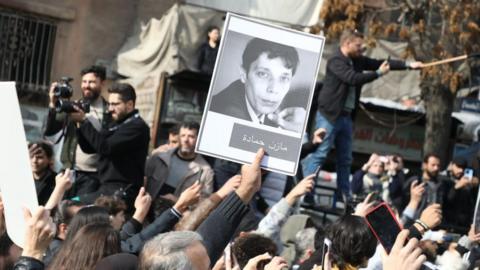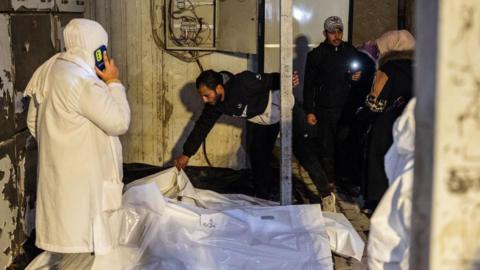'I wish he'd lived to see new Syria' - Crowds bury anti-Assad activist


While in asylum, Mazen's nephew Jad Al-Hamada says he began suffering from severe depression and other mental health issues. During this time, he was seen in a video claiming he was being threatened by members of Syria's ethnic minority Kurds, and called for violence against them in response. His family says he was not of sound mind at the time.
In 2020, he decided to return to Syria.
"The government told him he had a deal and that he would be safe. He was also told that his family would be arrested and killed if he didn't return," Lamyaa said.
He was arrested as soon as he arrived in the country. And his family believes he was killed after rebels took Hama last week, shortly before the regime fell.
"I am happy that we are free, but I wish he had lived to see it. He paid the price for our freedom," said Lamyaa.
Mazen's story is just a small glimpse into the atrocities committed by the Assad regime. More than 100,000 people disappeared under his rule, most believed to be dead. Now their families are searching for their bodies.
At the Damascus hospital, the bodies brought from Seydnaya were laid out in a morgue, and when they ran out of space, the most decomposed ones were kept in a shed-like structure just outside. The stench was overwhelming.
One body was decapitated. The others bore marks of severe torture.
In one corner, there was a plastic bag with a human skull and bones. Families were looking through it to identify their loved ones.

Nineteen-year-old Ahmad Sultan Eid's disfigured body was identified by his mother and brother. His mother nearly collapsed after she saw it, and nurses took her to the emergency room.
"Oh my boy, my baby, you were only 19," she wailed. "There's nothing left for us anymore."
Ahmad's brother leaned his face against a wall and wept.
All around us, people were holding up the photos of the loved ones they were searching for.
"I haven't been able to find anything. How can you find anything if you're looking through skeletons?" said Mustafa Khair-ul-Inam, an elderly man who had come looking for his two sons Omar and Mohammad who disappeared in 2011.
Amhad Masri meanwhile had come looking for his brother Khalil.
"Until now we weren't allowed to ask where our loved ones are, otherwise we would be arrested. Can you imagine our feelings? They didn't do anything and just like that they are gone. Maybe they are in a mass grave somewhere. Living in a jungle was better than living in Syria," he said.
Grief and rage – which couldn't be expressed openly until just a week ago – were pouring out.
"Every mother who is looking for her son should get revenge against Assad. Putin should not give him refuge. He should send Assad back so we can execute him in a public square," one woman shouted loudly.
I asked Mazen's sister Lamyaa what justice she wanted for her brother.
"The perpetrators of the crimes have all escaped. But I want them brought back so we can get justice in a court of law."
Additional reporting by Aamir Peerzadaa, Sanjay Ganguly and Leen Al-Saadi